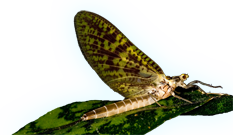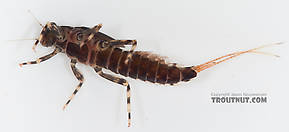Blog & Latest Updates
Fly Fishing Articles
Insects by Common Name

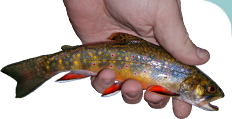
Mayfly Species Ephemerella aurivillii
Taxonomic Navigation -?-
Kingdom
Animalia (Animals)
» Phylum
Arthropoda (Arthropods)
» Class
Insecta (Insects)
» Order
Ephemeroptera (Mayflies)
» Species aurivillii
This is page 3 of specimens of Ephemerella aurivillii. Visit the main Ephemerella aurivillii page for:
- The behavior and habitat of Ephemerella aurivillii.
Pictures of 21 Mayfly Specimens in the Species Ephemerella aurivillii:
Male Ephemerella aurivillii Mayfly Dun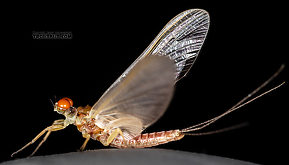 View 7 PicturesThis dun was collected in proximity to this spinner, and to this female that looks like the same species.
View 7 PicturesThis dun was collected in proximity to this spinner, and to this female that looks like the same species.
Among western species, it most closely resembles Ephemerella aurivillii, of which I reared a specimen from a positively-identified nymph and photographed the male dun previously in Alaska. In the photos, this dun does not seem to have the same evidence of the nymph's dorsal (Dorsal: Top.) stripe, but that's due to the lighting. A faint stripe is apparent under the microscope, as it is in the female linked above.
They do appear to be a bit short for aurivillii, with the male at 8 mm and the female at 9 mm, but the spinners could be a bit longer.
Among the other Ephemerella mayflies documented in Montana, Ephemerella alleni and Ephemerella mucronata are the only two others that seem to not be ruled out.
 View 7 PicturesThis dun was collected in proximity to this spinner, and to this female that looks like the same species.
View 7 PicturesThis dun was collected in proximity to this spinner, and to this female that looks like the same species.Among western species, it most closely resembles Ephemerella aurivillii, of which I reared a specimen from a positively-identified nymph and photographed the male dun previously in Alaska. In the photos, this dun does not seem to have the same evidence of the nymph's dorsal (Dorsal: Top.) stripe, but that's due to the lighting. A faint stripe is apparent under the microscope, as it is in the female linked above.
They do appear to be a bit short for aurivillii, with the male at 8 mm and the female at 9 mm, but the spinners could be a bit longer.
Among the other Ephemerella mayflies documented in Montana, Ephemerella alleni and Ephemerella mucronata are the only two others that seem to not be ruled out.
Collected July 1, 2019 from the Madison River in Montana
Added to Troutnut.com by Troutnut on July 18, 2019
Added to Troutnut.com by Troutnut on July 18, 2019
Male Ephemerella aurivillii Mayfly Dun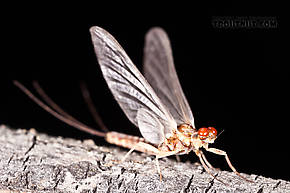 View 9 PicturesThis dun hatched in my aquarium on July 16th from an easily identified nymph collected on July 10th, and it molted into a spinner after I photographed it. The beautiful spinner form is listed as separate specimen. I forgot to photograph the dun with the ruler, but naturally his size is pretty similar to what it was as a spinner.
View 9 PicturesThis dun hatched in my aquarium on July 16th from an easily identified nymph collected on July 10th, and it molted into a spinner after I photographed it. The beautiful spinner form is listed as separate specimen. I forgot to photograph the dun with the ruler, but naturally his size is pretty similar to what it was as a spinner.
 View 9 PicturesThis dun hatched in my aquarium on July 16th from an easily identified nymph collected on July 10th, and it molted into a spinner after I photographed it. The beautiful spinner form is listed as separate specimen. I forgot to photograph the dun with the ruler, but naturally his size is pretty similar to what it was as a spinner.
View 9 PicturesThis dun hatched in my aquarium on July 16th from an easily identified nymph collected on July 10th, and it molted into a spinner after I photographed it. The beautiful spinner form is listed as separate specimen. I forgot to photograph the dun with the ruler, but naturally his size is pretty similar to what it was as a spinner.Female Ephemerella aurivillii Mayfly Dun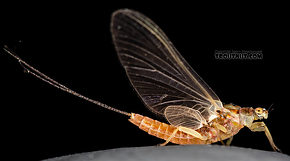 View 6 PicturesThis female was collected in proximity to a male that looks like the same species.
View 6 PicturesThis female was collected in proximity to a male that looks like the same species.
 View 6 PicturesThis female was collected in proximity to a male that looks like the same species.
View 6 PicturesThis female was collected in proximity to a male that looks like the same species.Collected July 1, 2019 from the Madison River in Montana
Added to Troutnut.com by Troutnut on July 18, 2019
Added to Troutnut.com by Troutnut on July 18, 2019
Ephemerella aurivillii Mayfly Nymph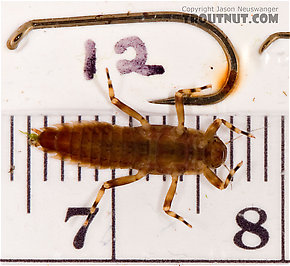 View 9 PicturesI'm pretty sure this is Ephemerella aurivillii. The body is 11mm long, which rules out most other species, and the hind legs seem to be more than 1.5 times longer than the fore legs -- a key characteristic for this species.
View 9 PicturesI'm pretty sure this is Ephemerella aurivillii. The body is 11mm long, which rules out most other species, and the hind legs seem to be more than 1.5 times longer than the fore legs -- a key characteristic for this species.
This specimen isn't in the best of shape, as it's missing all three tails, but it's the only one of its species I captured in this sample.
 View 9 PicturesI'm pretty sure this is Ephemerella aurivillii. The body is 11mm long, which rules out most other species, and the hind legs seem to be more than 1.5 times longer than the fore legs -- a key characteristic for this species.
View 9 PicturesI'm pretty sure this is Ephemerella aurivillii. The body is 11mm long, which rules out most other species, and the hind legs seem to be more than 1.5 times longer than the fore legs -- a key characteristic for this species.This specimen isn't in the best of shape, as it's missing all three tails, but it's the only one of its species I captured in this sample.
Collected May 6, 2007 from Mongaup Creek in New York
Added to Troutnut.com by Troutnut on May 18, 2007
Added to Troutnut.com by Troutnut on May 18, 2007
Female Ephemerella aurivillii Mayfly Dun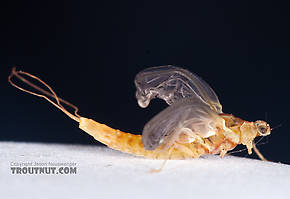 View 5 PicturesThis dun hatched out in my aquarium from this nymph.
View 5 PicturesThis dun hatched out in my aquarium from this nymph.
 View 5 PicturesThis dun hatched out in my aquarium from this nymph.
View 5 PicturesThis dun hatched out in my aquarium from this nymph.Ephemerella aurivillii Mayfly Nymph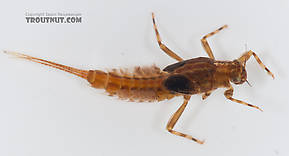 View 5 PicturesThis nymph hatched out in my aquarium into this dun.
View 5 PicturesThis nymph hatched out in my aquarium into this dun.
 View 5 PicturesThis nymph hatched out in my aquarium into this dun.
View 5 PicturesThis nymph hatched out in my aquarium into this dun.Ephemerella aurivillii Mayfly Nymph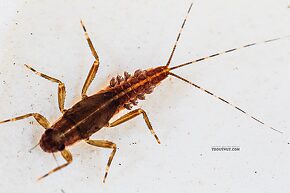 View 11 PicturesThis is a puzzling one to identify and I'm not sure about the species. The maxillary palp (
View 11 PicturesThis is a puzzling one to identify and I'm not sure about the species. The maxillary palp (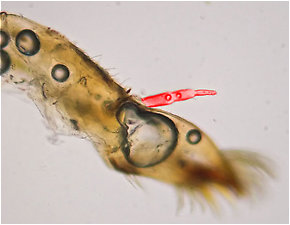 Palp: A long, thin, often segmented appendage which can protrude from certain insect mouth parts such as the maxillae. Also known as the < />palpus.) is present and segmented, and the maxillary canines are not strongly serrate laterally. I think it's Ephemerella, not Serratella. The ventral (Ventral: Toward or on the bottom.) lamellae of the gills on abdominal segment 6 have a clear median notch with a depth at least half the length of the lamellae, which points toward a couple of uncommon species (most likely Ephemerella alleni), but the abdominal tubercles (
Palp: A long, thin, often segmented appendage which can protrude from certain insect mouth parts such as the maxillae. Also known as the < />palpus.) is present and segmented, and the maxillary canines are not strongly serrate laterally. I think it's Ephemerella, not Serratella. The ventral (Ventral: Toward or on the bottom.) lamellae of the gills on abdominal segment 6 have a clear median notch with a depth at least half the length of the lamellae, which points toward a couple of uncommon species (most likely Ephemerella alleni), but the abdominal tubercles (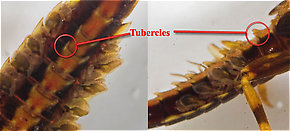 Tubercle: Various peculiar little bumps or projections on an insect. Their character is important for the identification of many kinds of insects, such as the nymphs of Ephemerellidae mayflies.) and coloration don't fit that species. To add to the confusion, none of the above species are expected to emerge in the fall, as far as I know. I'm going to call this one Ephemerella aurivillii for now, but that's highly uncertain.
Tubercle: Various peculiar little bumps or projections on an insect. Their character is important for the identification of many kinds of insects, such as the nymphs of Ephemerellidae mayflies.) and coloration don't fit that species. To add to the confusion, none of the above species are expected to emerge in the fall, as far as I know. I'm going to call this one Ephemerella aurivillii for now, but that's highly uncertain.
 View 11 PicturesThis is a puzzling one to identify and I'm not sure about the species. The maxillary palp (
View 11 PicturesThis is a puzzling one to identify and I'm not sure about the species. The maxillary palp (
The palp on the maxilla of an Ephemerella nymph (detached and photographed under a microscope) is highlighted in red here.

A few (not all) of the abdominal tubercles on this Ephemerella needhami nymph are circled. They are especially large in this species.
Collected September 10, 2020 from the Foss River in Washington
Added to Troutnut.com by Troutnut on September 19, 2020
Added to Troutnut.com by Troutnut on September 19, 2020
Top 10 Fly Hatches
Top Gift Shop Designs
Eat mayflies.
Top Insect Specimens
Miscellaneous Sites
Troutnut.com is copyright © 2004-2024 Jason
Neuswanger (email Jason). See my FAQ for information about use of my images.
 privacy policy
privacy policy
